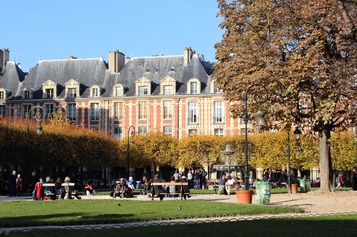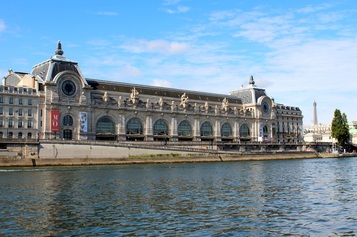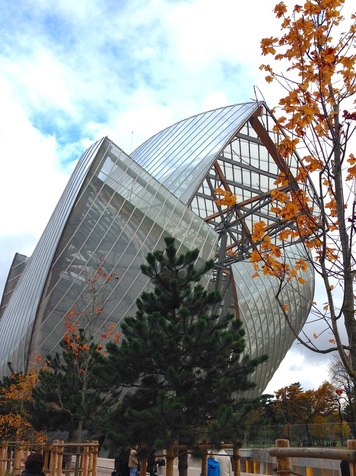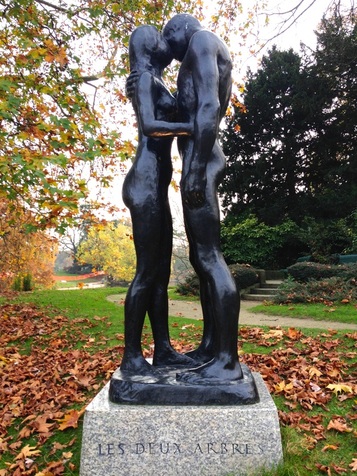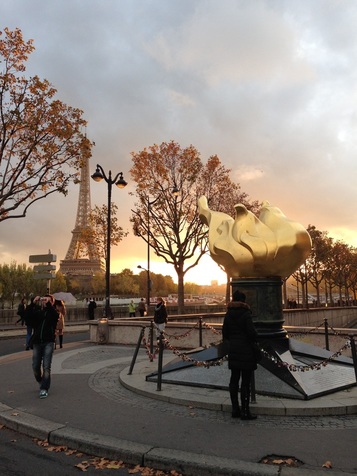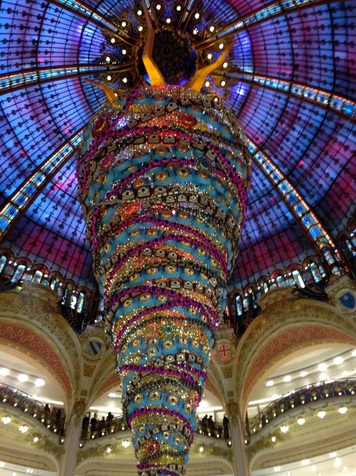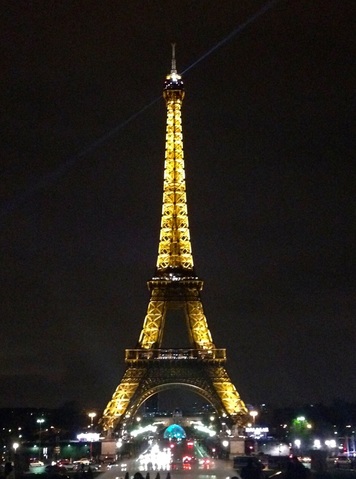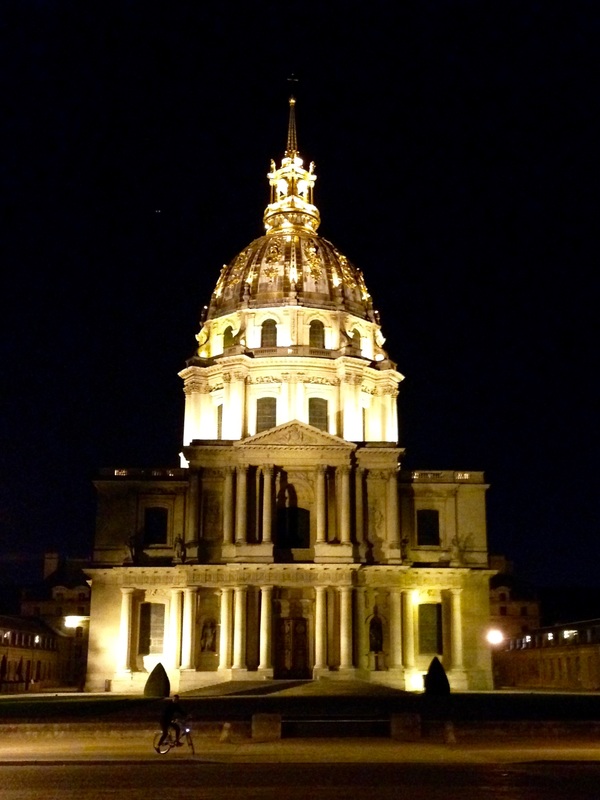1) PARISIAN HOUSEWIFE
|
Today is the first day of the rest of my life.
"That’s so obvious and clichéd," I hear you say. Yes, it’s a cliché, but perhaps you might also consider that it could be worth exploring that cliché in a little bit more detail. Today is the only day in which life happens. When yesterday happened, it was today. When it's tomorrow, it today already. This moment is the only moment in which life unfolds, everything else is memory or projection. Right now is the only thing that is, ultimately, real. Anything that happened in the past happened in a past now, and is recalled as a memory of that—now non-existent—past moment. Anything that will happen in the future will happen in a future now. A now which, when it occurs, will no longer be the future, but the now. Again, it all sound so obvious, but what are the deeper implications of truly seeing this? As a way of attempting to answer this question, I'd like to describe, in minute detail, this moment as it exists for me right now. Right now I'm here. I'm here in a particular solar system of a certain galaxy, somewhere in the infinite expanse of space. I'm here on the surface of the planet that is called by its inhabitants, Earth. I'm here on the continent that goes by the name, Europe. I'm here in the city that is called Paris. I'm in the 4th arrondissement of Paris. I'm in a fourth floor apartment, sitting in a chair . . . and I'm being. I'm being a human being. I'm being myself. I'm being Stevie. As my good friend Jared would say, "You're Stevie-ing." My heart is beating, about 60 beats/minute. My chest and lungs are breathing, maybe ten breaths/minute. My organs are functioning. The billions of cells that make up my body are absorbing nutrients, producing energy, proteins, and hormones, conducting nerve impulses, etc, etc. The uncountable molecules, atoms, and subatomic particles that make up these billions of cells are all in constant motion, vibrating unceasingly. All of this is taking place within a vast, formless, timeless, ocean of Emptiness. My arms and hands are moving intermittently. My fingers are touching the computer keyboard. My eyes are roving, keeping my gaze centred on the current object of interest on my computer screen. Eyes that are part of the apparatus for the visual perception of letters, words, and images that are directly ahead of me on the screen, but which also, mysteriously, register the peripheral surroundings of the room I'm sitting in, without me consciously knowing that I'm seeing them. My ears are capturing sounds for hearing, my nose breathing in odours for smelling, my mind is using thoughts for thinking, and my soul . . . is being, and loving, and creating. My mind—clever thing that is, I'm really quite fond of it, though it can be quite a handful at time—will occasionally, by sifting through its seemingly endless store of past experiences, come up with a memory to obsess about for a while. This memory might then be judged as either good or bad by a subsection of my mind—the part that goes by the name Judge, or Super-ego. If that judgment is good, then emotions such as happiness, satisfaction, contentment, joy, or pleasure may arise. If the judgment is bad, then regret, guilt, remorse, insufficiency, or shame may appear. Sensations then occur in my physical body as a result of the arising emotions; tangible evidence of my thoughts as they manifest in my physical body. Elkhart Tolle describes this beautifully when saying that, "the body is a duplicating machine for the mind." Moments later, my mind may think about something that's going to happen in the future. Positive and negative emotions can arise here also: anticipation, eagerness, readiness, excitement, thrill; worry, concern, irritation, anxiety, fear. All further opportunity for emotional self-inquiry. My physical form is frequently moved into action in response to external circumstances, or according to some internal instinctual impulse or desire. As these actions arise, seemingly out of nowhere, they can be co-opted by the mind, owned, possessed, and identified with. As a result of this owning, these arising actions are turned into the next reproduction of Stevie's past conditioning: repetitive, mechanical, reactive. These conditioned actions generally possess little in the way of originality, spontaneity, or creativity. Alternatively, action can arise and remain free of the mind . . . if the mind is able to remain open, and unidentified. The arising action is then untainted by knowing, or by past experience, and as such is a true expression of the creative aspect of the Divine in action. I love Papaji’s description of enlightened action as, “Emptiness dancing ." Today I'll cycle on a Velib’--the free-ish bike system here in Paris at present—to UNESCO for a tour of the austere late 1950s building, located in the 7th arrondissement, with Andy. This will be followed by lunch in the cafeteria—complete with dramatic views of Le Tour Eiffel and the Seine—with his work colleagues. Andy’s contract editing the 2014 Global Monitoring Report on Education runs for four months, from October 2014 to February, 2015. On my way back to the apartment—which is in Beaubourg, near Centre Geroges Pompidou—I'll stop at La Grande Epicerie to buy the ingredients to cook Bœuf Bourguignon, or as we call it back home in Australia, Beef Burgundy. The life of a Parisian housewife: I kiss Andy goodbye in the morning as he walks out the door on his way to work; I make the apartment clean and inviting; I go shopping—baguette, butter, cheese, wine, candles; I prepare a traditional French meal that's ready when Andy returns home in the evening, the apartment suffused with the odours of la cuisine. An aperitif is prepared and delivered into eager hands, ears ready to receive the download of the events of the day and the office politics. Andy may bring home a small gift—chocolates, flowers, patisseries --a token of his appreciation for my role as housewife. What a strange life? A life that could feel isolated, lonely, and empty of meaning. But today I choose another option; I choose the red pill; I choose to attempt to discover how deep the rabbit-hole goes; I choose a life that's full of infinite possibilities. In this present-moment centred way of being—free of past and the future, free of time, and free of the limiting concepts of the dualistic mind—just to walk out the door of the apartment and onto the streets of Paris is to enter a world of wonder beyond the wildest imagination. I go out and explore my neighbourhood. To be open, and willing to receive anything and everything that presents itself throughout the day, without filter or judgment, is currently what feels to be primary in maintaining this non-state of Presence. To keep nothing out. To say "Yes", resoundingly, to everything, whether it be the shy glance of a child, cowering behind his mother’s legs, clutching her hand for safety; the look of longing on a beggar's face, hands outstretched, pleading for my attention and for my riches; the subliminal message delivered by an advertising billboard, stimulating the desire to consume; the crush of the Metro and its stressed commuters, projections flying and hooking like invisible spider’s webs; a sharp burst of sexual energy that flows forcefully from a passerby as his gaze meets mine momentarily, then is just as abruptly withdrawn and redirected as he hurries past. When this capacity to open and receive is fully present, without moving, I've discovered that it is possible for my mind to open further, and for attention to drop deeper inside, to where it's possible to see the subtlest movements of desire as they first start to arise. Papaji said, "Mind, actually, doesn't exist; mind arises when desire arises." I've observed, deep in myself, that the energy fueling this first arising of desire is derived from the avoidance of feeling the deep, painful, negative emotions of shame, self-hatred, and self-loathing. The ego—a psychological structure that is absent at birth, but which develops in early childhood in every human as a survival mechanism—needs to constantly be in motion, and in opposition, to survive. This constant activity is, in me, motivated by the need to avoid feeling the pain associated with perceiving myself as inherently damaged, and therefore forever separate from love. The constant activity of the ego is also fuelled by the avoidance of feeling the terror that arises when one truly realises that one is not in control, and that, finally, death of the individual form is inevitable. The constant arising of desire, and the subsequent movement of the mind into the future, and hence away from the present moment, is the movement that perpetuates the existence of the knot of thoughts that comprises the core of the ego. This tangle of thoughts is clustered around the most strongly held central thought, the "I" thought. Then—as the Buddha points out as one of his Four Noble Truths—the obligatory outcome of the following of desire, suffering. The indulging of desires for things outside oneself may give temporary happiness, and momentary relief from the pain of one's time-bound existence, but in the long run following desire will only ever perpetuate psychological pain, never transcend it. Life then becomes a hamster-wheel of pursuing the next desired object or circumstance to temporarily alleviate the endless pain associated with being an egoically identified human being. This is the state that arose out of Original Sin, that arose out of having the knowledge of good and evil. The opportunity, then, is in each moment to notice the arising of desire . . . and to not follow it. To not move. The possibility is to be free of the unconscious conditioning that's been programmed into this body/mind/ego. Conditioning both inherited through the DNA, as well as derived from family dynamics in early childhood (especially with the mother), schooling, media, society, and now the Internet. To be aware of the conditioning as it arises, to allow it to be, to not judge it as either good or bad, to know deeply that it's not who one is, and to not follow it. That's the key. One then has a choice: to follow desire back into mind-identification and further suffering (reincarnation) . . . or to stop. To not follow the next desire; to not follow the next tendency to move away from the majesty and fulfilment of life in all its splendour in the present moment. Now. Today is the first day of the rest of my life . . . Angel Stevie Paris, October 28th, 2014. |
